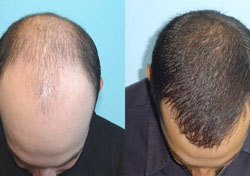Hair transplants are one of the most sought after surgical procedures today. It can help balding men and women restore their crowning glory once again so that they can look good and feel good about themselves. However, don’t believe it when others say that you can report to work the day after your hair transplant. While this is an outpatient surgical procedure, it is anything but a minor surgery. There are things you need to know, particularly on what to expect once the operation is done. Knowledge on this would help you manage your expectations well and help you determine what you need to do once you step out of the surgeon’s clinic.

What to Expect After Getting a Hair Transplant
After your hair transplant, you should experience the following:
- On the first day, you will feel some soreness on the donor site. You will need to wash your hair thoroughly but gently so that the grafts will be rid of dried blood.
- By the 2nd to the 3rd day, you will notice that your scalp will be mostly rid of scabbing and the soreness will start to disappear. Though you might experience some numbness, it should be a bit minimal at this point. However, you will also notice redness and swelling.
- About a week after the operation, redness and soreness should already be gone and at this time, you will need to see your doctor so he can check the recipient and donor sites.
- Two weeks after, you will notice hair starting to grow and sutures starting to get absorbed. You will hardly feel numbness at this time.
- After two months, transplanted hair would already grow at normal rate and you should no longer feel any hint of numbness. Your doctor will need to see you 6 to 8 months after so that he can check if you need another hair transplant surgery for optimum results.
Possible Problems After Hair Transplant
Understand that majority of hair transplant surgeries are safe and successful but since there is really no way to guarantee a fail-proof operation, you need to be aware of possible complications. Most of these less than ideal outcomes are quite inconsequential and do not really affect the final results. For one, you might feel numbness for several weeks, with some experiencing it for a few months. Another issue is that infections could develop however this can be remedied with the help of doctor-prescribed antibiotics. Scars may also develop and would become a problem to people whose genetic makeup make them susceptible to building excessive scar tissues.
Care Tips After Your Hair Transplant Procedure
In order to achieve the best results, you need to follow the right post-operative care procedures. First of all, it is important that you regularly wash your hair in order to remove scabs, dirt, oil, and blood. Shampooing and proper hygiene also helps prevent infections. Your surgeon might prescribe a saline solution in order to keep the recipient and donor sites moist so use it religiously. Lastly, be patient. It takes time for transplanted hair to grow and look natural on your head so do not be in a hurry to see the results.
